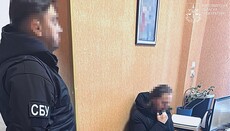Bremer: If they ban UOC, why don't they ban police or local authorities?

The German theologian pointed out that the practice of collective responsibility towards the UOC is absurd.
Professor Thomas Bremer from WWU Münster wrote a letter to DESS head Viktor Yelensky, stating that it is unacceptable to apply the practice of collective responsibility and ban an entire denomination based on criminal proceedings against individuals. The letter by Bremer was published on the "Dialog.tut" website.
He points out to Yelensky that he is aware of allegations against some UOC hierarchs of lacking patriotism or holding political views different from those in the government.
"However, according to Ukrainian legislation, it is not prohibited to behave tastelessly, be unpatriotic, or hold political views different from the government. Therefore, none of those hierarchs have been convicted," Bremer notes.
He writes that "even when cases are opened against them (as has happened recently), accusations are always brought against individual persons, just as the police, local leaders, or politicians who collaborated with the occupiers are condemned." "In the case of the UOC, the organization itself is accused (as in your letter), while no one thinks about accusing or banning the police, local authorities, or the political system as a whole," the German theologian points out.
He emphasizes that "the positions and opinions of individual persons are one thing, while the official position of an organization is another."
"And if the UOC is to be judged, then its official position should be judged. Since February 24, 2022, it has been calling the Russian aggression exactly what it is, Russian aggression, and emphasizes Ukraine's sovereignty and territorial integrity. This is a clear and consistent position of the highest authorities – incidentally, in clear contradiction with the position of the ROC," Bremer writes.
He points out to the head of DESS that the "non-state" status of the output of the State Ethnopolitics expertise on the "connections" of the UOC with the ROC is nothing but manipulation because "everyone involved knew that its results would be used for state purposes."
"Experts worked with a state mandate, and they did not make this conclusion as a scientific publication or private text. Even if one could argue that the Commission itself is not a state entity, the adoption of the DESS conclusion without any changes makes the 'Conclusion' a state document used by state institutions. So this whole thing is a state matter, even if individual specialists are not government employees," the theologian said.
As previously reported by the UOJ, according to Bremer, there is no evidence of UOC's connection to Moscow.






